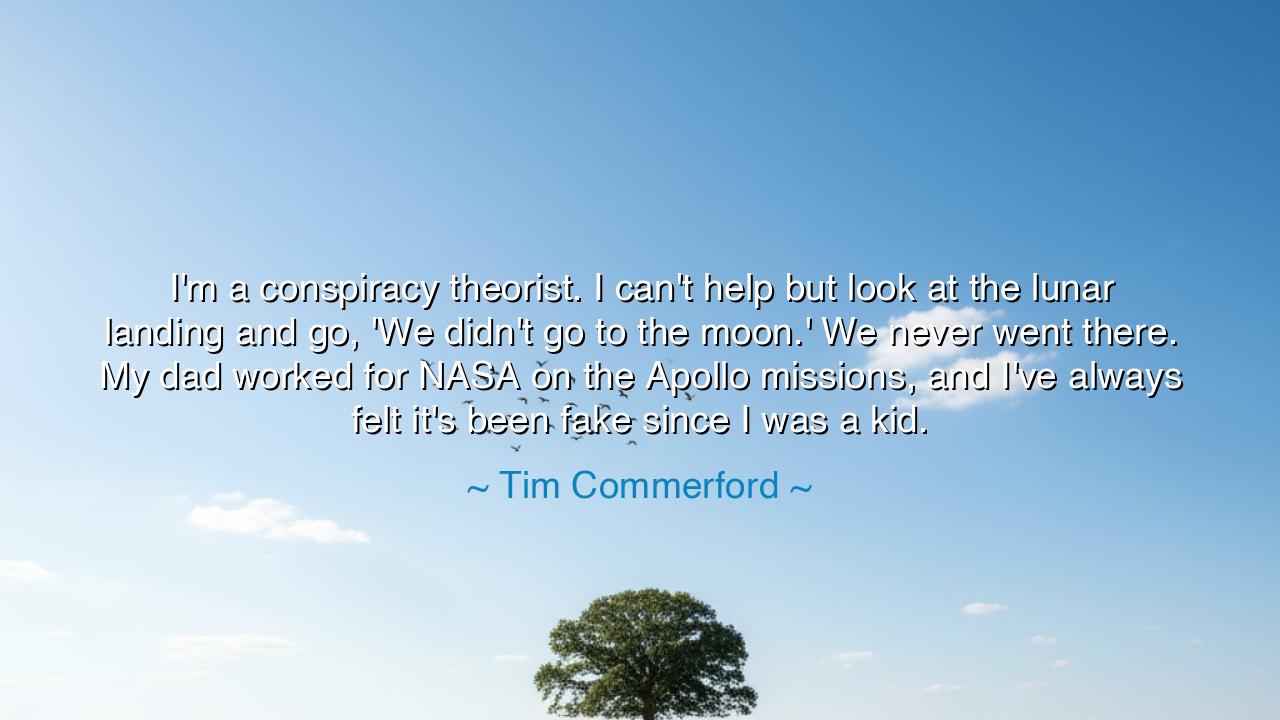
I'm a conspiracy theorist. I can't help but look at the lunar
I'm a conspiracy theorist. I can't help but look at the lunar landing and go, 'We didn't go to the moon.' We never went there. My dad worked for NASA on the Apollo missions, and I've always felt it's been fake since I was a kid.






Hear, O children of doubt and seekers of truth, the words of Tim Commerford, who said: “I’m a conspiracy theorist. I can’t help but look at the lunar landing and go, ‘We didn’t go to the moon.’ We never went there. My dad worked for NASA on the Apollo missions, and I’ve always felt it’s been fake since I was a kid.” Beneath these provocative words lies not merely rebellion or suspicion, but the deeper pulse of human nature—the eternal tension between belief and disbelief, between what is seen and what is trusted. His voice, born of curiosity and conflict, speaks to a universal condition: the restless mind’s struggle to reconcile faith in knowledge with the yearning for truth unshrouded.
Commerford’s statement is more than a doubt about history—it is a mirror reflecting the modern crisis of faith. For in every age, mankind must decide whether to trust the hands that build or to question the light that shines. The moon landing, one of the greatest achievements of human ingenuity, has also become one of the greatest subjects of suspicion. That his father himself worked at NASA, shaping the very dreams that launched humanity toward the stars, only deepens the paradox. His disbelief is not rebellion against strangers, but a quiet storm within—the son questioning the father, the dreamer questioning the dream.
Yet there is a kind of poetry in this doubt. For the ancients, too, wrestled with unseen truth. When the philosopher Diogenes walked the streets of Athens with a lamp in daylight, searching for an honest man, he too was confronting the uncertainty of appearances. And when Galileo defied the heavens of dogma, saying that the Earth moved, he too was called a heretic. Thus, skepticism, though painful, has always been the shadow that walks beside progress. It is not the destroyer of truth, but its relentless purifier. Questioning, even when uncomfortable, is the furnace in which genuine understanding is forged.
But Commerford’s words also warn of another danger—the peril of distrust unbound. For doubt, when untethered from wisdom, can devour reason itself. There is a difference between seeking truth and fleeing from it. The balance lies in humility—to question, yet not deny; to wonder, yet not dismiss. The one who doubts everything becomes blind to revelation; the one who believes everything becomes slave to illusion. The wise walk the narrow road between the two, testing all things and clinging to what is good.
In the story of the moon landing, we find a modern parable of faith. The scientists who reached for the stars did so not with certainty, but with courage. Their belief was not blind; it was disciplined faith—faith in calculation, in cooperation, in the potential of humankind. They risked their lives not for spectacle, but for progress. To look upon their work with suspicion is to forget that truth often demands both skepticism and trust. For progress is born not in certainty, but in the marriage of doubt and determination.
And yet, Commerford’s words, in their raw sincerity, carry a lesson of their own. They remind us that every generation inherits both the dreams and the doubts of its ancestors. The child of the scientist may not inherit his father’s conviction, but his yearning for truth. In questioning the moon, Commerford continues the very spirit of inquiry that made the moon landing possible. He shows that even disbelief, when guided by honesty, is part of the sacred human pursuit to understand the universe.
So let the teaching be this: question what you are told, but also question your questioning. Seek not to destroy wonder but to deepen it. The moon need not be denied to be rediscovered. The world does not demand blind faith nor cynical rejection, but the courage to search, to learn, to verify. Be like the philosopher who gazes upward—not to mock the stars, nor to worship them, but to know them more truly.
Thus, the words of Tim Commerford, though born of doubt, lead us back to the oldest of human lessons—that truth is not a possession but a pilgrimage. Whether one believes in the footprints on the moon or not, the greater journey is the one within—the endless ascent of the mind toward light, where faith and reason finally meet and bow to the same mystery.






AAdministratorAdministrator
Welcome, honored guests. Please leave a comment, we will respond soon